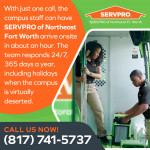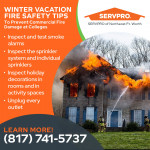SERVPRO of Northeast Fort Worth understands the seasonal hazards and restoration services that may be needed during the winter months. The team provides property damage cleanup and restoration to more than homes and businesses. Technicians also serve colleges and universities that have suffered fire damage, smoke damage, water damage, or storm damage. SERVPRO also provides biohazard, crime scene, and suicide cleanup and restoration.

The summer vacation begins with students removing everything from their rooms. However, during the holiday vacation, students depart for home while leaving everything in their rooms. The presence of personal belongings in thousands of dorm rooms at a college or university dramatically escalates the risk of fire. A percentage of the unoccupied rooms are a high fire hazard risk. Students are provided with a detailed list of strict instructions before closing and locking the door to the dormitory room. The fog of all-nighters for final exams, the excitement of seeing friends and family, and the rush to start the journey home for the holidays contribute to some students inevitably failing to carefully follow the proper fire safety prevention steps before leaving campus.
According to the fire inspection and safety professionals at Fire & Life Safety America, important lessons can be learned from the past. “Just look at the past. There have been too many blazes that have affected schools before. For instance, the Providence College fire of 1977 that began because of a lamp directed at a manger scene as part of Christmas decorations. Almost 20 people were either killed or injured in that fire. Or more recently, the Seton Hall University fire in January of 2000. Three students were killed, and 58 students were injured when the fire began in a lounge and quickly spread. Even today, there are approximately 4,000 fires on college campuses every year, causing roughly $26 million in property loss.”
Many positive steps can be taken to prevent fires and fire damage in college and university dormitories when classes are not in session, and students are away from campus for weeks. Include these tips when conducting fire inspections during the holiday break.
Inspect and test smoke alarms
A smoke alarm is the first line of defense in discovering, extinguishing, and surviving a fire. This early warning system alerts students and staff to fire danger. The alert gives students and personnel time to investigate the situation and possibly extinguish the fire. If the circumstance warrants, the building fire alarm is activated, and occupants in the building safely and quickly evacuate the facility according to the evacuation plan. In most cases, activation of the building’s fire alarm system also automatically notifies first responders from the fire department, who are on the scene within minutes.
Inspecting dorm room smoke alarms is simple, quick, and ultimately saves lives. Smoke alarms are essential to any fire prevention and survival strategy, and testing and maintenance of these alarms are the top priority.
While most colleges and universities are smoke-free environments, this classification does not always guarantee student compliance. Unfortunately, some students circumvent the rules and disable the room’s smoke alarm. The vacation inspection identifies disabled alarms, which can be re-activated, repaired, or replaced before students return.
Inspect the sprinkler system and individual sprinklers
Dorm life can be rowdy and rambunctious at times, and sprinklers can become damaged. Efforts to decorate a dorm room can compromise sprinkler performance if the fixtures have been tampered with. Paint, string, streamers, garland, mistletoe, and other items may inadvertently impair sprinkler function. A quick but close inspection of each head can identify damage or impairment from decorations.
Inspect holiday decorations in rooms and activity spaces
Combustibles should be located at a safe distance from heat sources, including holiday decorations. Christmas lights and other decorative lighting should be turned off and unplugged, including battery-powered lights. The heat from lights can be an ignition source for nearby combustibles.
Unplug every outlet
As a general rule, all electrical appliances or devices should be unplugged, and power strips should also be unplugged. All electrical outlets should be empty. The power may be shut off in dormitories and buildings with zero occupancies during the holidays. When the power is restored, devices or appliances, if plugged in, may overload and cause a fire.
Look for overloaded extension cords and power strips. Address the issue when students return from vacation. Some schools do not permit the use of hot plates, electric grills, toasters, air fryers, or other cooking appliances in dorm rooms. If institutional policy bans these appliances, they should be confiscated and removed from the room.
Pre-qualify SERVPRO of Carrollton as the dedicated property damage cleanup and restoration provider
With just one call, the campus staff can have SERVPRO of Northeast Fort Worth arrive onsite in about an hour. The team responds 24/7, 365 days a year, including holidays when the campus is virtually deserted. If the disaster involves multiple rooms, several floors, or the entire building, SERVPRO can scale to tackle any size disaster. The latest equipment, cutting-edge technology, advanced cleaning techniques, and EPA-approved disinfecting, sanitizing, and deodorizing products enable technicians to quickly clean up and restore any size or type of damage disaster.

By following these simple tips and implementing these guidelines, a college or university can avoid the primary causes of fire and fire damage in dorm rooms during the holiday vacation. To learn more about seasonal fire damage restoration services in Arlington Heights, Fort Worth, TX 76107, contact SERVPRO of Northeast Fort Worth at (817) 741-5737 or email office@servpronortheastftworth.com.
































